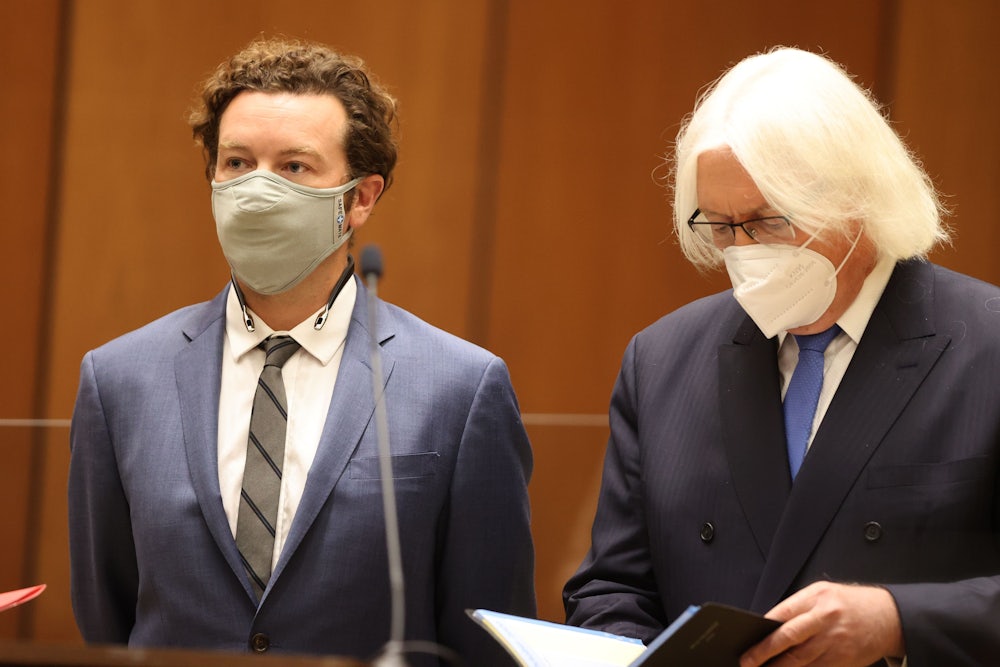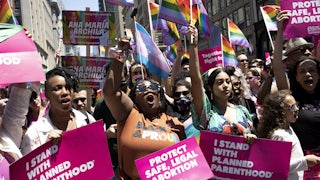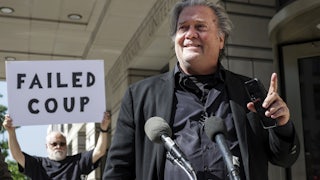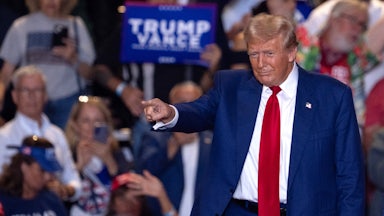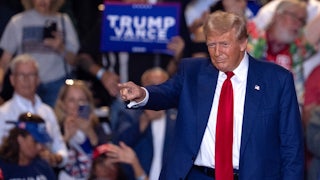The Church of Scientology is no stranger to the American legal system. Its decades-long battle to obtain tax-exempt status is perhaps the most famous in the history of the IRS. The Justice Department indicted some of its top members in the 1970s for a wide-ranging plot to infiltrate the federal government. The church’s reputation for litigiousness is so strong that HBO hired at least 160 lawyers when it agreed to make a documentary on Scientology in 2014.
Last week, the church asked the Supreme Court to help move a dispute out of the legal system and into the church’s own. At issue is whether the Church of Scientology can compel ex-members who accused it of misconduct into a religious arbitration process that it supervises. A California appeals court said no earlier this year, concluding that such compulsion would violate the ex-members’ First Amendment rights. The church claimed that the ruling infringed upon the church’s ability to organize and discipline its congregants—a Gordian knot of religious freedom claims that the justices may soon decide whether to cut.
The case, Superior Court v. Bixler, began after a group of women sued the Church of Scientology in 2019. The women, who were former Scientologists, told the Los Angeles Police Department during the #MeToo movement’s emergence a few years ago that they had been sexually assaulted by Danny Masterson, an actor and fellow Scientologist. Shortly after they reported Masterson to police, the women said, they faced a barrage of harassment and abuse, including surveillance, hacking attempts, wiretaps, property damage, attempted arson, threatening phone calls, pet killings, and more.
Chrissie Carnell Bixler, the named plaintiff, and two other women in the lawsuit claimed that the church targeted them in retaliation for going public with their allegations against Masterson. They cited past instances where Scientologists had harassed their perceived foes and critics under the church’s “Fair Game” policy. In court filings, the church denied any wrongdoing and claimed that L. Ron Hubbard, the movement’s founder, had suppressed Fair Game in 1968.
To quash the lawsuit, the church invoked legal agreements signed by the plaintiffs when they were members, in which they agreed to use religious arbitration instead of the civil legal process. The contracts vary slightly in language, but they contain two key provisions at the heart of the dispute. First, the plaintiffs gave up the right to sue or seek legal redress against the Church of Scientology in perpetuity. One of the plaintiffs signed an earlier and possibly more limited version of this waiver, while the other three signed later versions that cover the church itself, its satellite organizations, and its employees. Second, the plaintiffs agreed that the arbitrators themselves “shall be Scientologists in good standing with the Mother Church,” which could undermine the process’s impartiality.
Religious arbitration isn’t unique to Scientology. Some synagogues, for example, require new members to accept the jurisdiction of a rabbinical court for spiritual disputes. Christian denominations often have their own internal ecclesiastical processes, ranging from the Roman Catholic Church’s system of canon law to the boards and panels used by Protestant churches for internal discipline. Islam’s body of religious law, known as sharia, plays a similar role in Muslim communities. While Scientology’s use of religious arbitration may be more sweeping and aggressive than in other faiths, it is legally similar enough that a coalition of religious groups sided with them in the lower courts.
In response, the plaintiffs urged the court to throw out the contracts. A California judge declined to do so and upheld the arbitration agreements, but the California Court of Appeals overturned the ruling on appeal in January. The appeals court concluded that enforcing the contract would violate the plaintiffs’ First Amendment rights to change their religious beliefs. “In effect, Scientology suggests that one of the prices of joining its religion (or obtaining a single religious service) is eternal submission to a religious forum—a sub silencio waiver of petitioners’ constitutional right to extricate themselves from the faith,” the court wrote. “The Constitution forbids a price that high.”
The court of appeals’ ruling was unusual from a procedural point of view. For one, constitutional rights like those protected by the First Amendment typically constrain the government’s power and not that of private entities. The Church of Scientology is obviously not a government agency, and so the First Amendment’s protections for religious freedom do not generally bind it. But the lower court concluded that enforcing the contract through the judicial system could qualify as state action in this context. (That is also why the case title says “Superior Court” instead of “the Church of Scientology.”)
The church countered that judicial enforcement of a contract isn’t typically considered to be a state action, citing a range of precedents from other types of legal disputes. In a footnote, the appeals court pointed to one of its own precedents, in which the court refused to enforce a written agreement between a Christian mother and Jewish father to raise their children in the Jewish faith. The two parents subsequently divorced, and the mother, who had converted to Judaism, converted back to Christianity and sought to raise their child in that faith.
“We believe cases such as In re Marriage of Weiss, which specifically hold that a party cannot bargain away her constitutional right to change religions, are the appropriate precedent,” the court explained. “In contrast to Scientology’s theory that enforcing agreements which limit the right to change religions would not constitute state action, those authorities recognize that court enforcement of such an agreement would encroach on a person’s fundamental constitutional right.”
After the California Supreme Court refused to hear the Church of Scientology’s appeal earlier this year, the organization turned to the U.S. Supreme Court for relief. Its petition for review also framed the dispute as a matter of religious freedom. “The notion that the First Amendment empowers the state to regulate the covenant between a church and its congregation could not be more wrong or dangerous,” the church told the court. “Rather, the First Amendment forbids the state to weigh the reasonableness of the ‘price’ of joining a religion, whether that price be a baptism, bris, holy communion, or an agreement to be bound by ecclesiastical law in all dealings with the religion.”
There is a curious paradox of sorts in Scientology’s stance. On one hand, the church asked the courts to treat the agreement it struck with its former adherents like any other civil arbitration contract, which generally would be enforced by the courts if breached. At the same time, it framed the contracts in inescapably spiritual terms by arguing that they deserve additional protection from judicial scrutiny under the First Amendment.
Predicting which cases the Supreme Court will agree to review is often guesswork, and there is no guarantee that the justices will take this one up. For one, the California Court of Appeals handed down its decision in an unpublished ruling—not in the literal sense that it wasn’t written down but in the sense that it isn’t supposed to carry precedential weight in similar proceedings in the future. That may dissuade the justices from delving into a highly publicized legal battle where the overall stakes for the law are, at first glance, fairly minimal.
At the same time, the church noted that even unpublished opinions can still be cited in the federal courts and in other states’ courts and that the case’s high-profile nature means the ruling may be more widely known and influential than the average unpublished opinion. And if there is one area of the law where the justices have been particularly eager to intervene as of late, it is when religious groups claim that someone has violated the First Amendment’s pledge of neutrality toward different faiths or toward faith in general.
If the court takes up the case, it would also be its first opportunity to weigh in on religious arbitration. “This Court has not directly addressed the enforceability of religious arbitration agreements generally or their enforceability following a contracting party’s departure from the faith,” the church argued. “Given the nationwide importance of religious dispute resolution procedures and their utilization in many faith traditions, the Court should grant review to confirm the continued validity of this time-honored practice, upon which the erroneous opinion has cast doubt.”
Even if the justices decline to hear this dispute, the rapid growth of religious arbitration contracts in nonecclesiastical contexts may eventually compel them to answer the underlying constitutional questions. Does the First Amendment favor religious arbitration contracts as a means of letting churches and other religious organizations manage their internal disputes? Or does it disfavor those contracts by allowing members to break them just by leaving the church itself? For a Supreme Court that often sides with religious freedom claims, choosing between them may be a no-win scenario.
